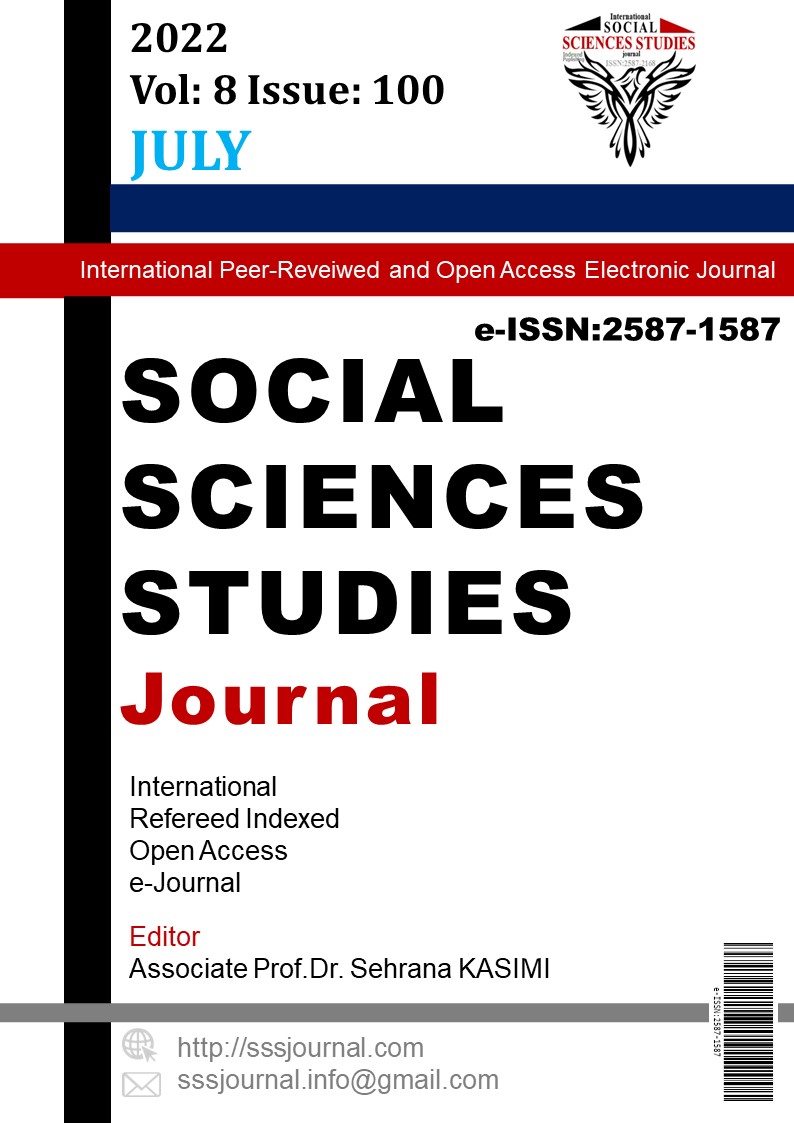Balıkesir Üniversitesi Spor Bilimleri Fakültesi Öğrencilerinin Psikososyal Gelişim Açısından Bilgelik Gelişiminin İncelenmesi
Author :
Abstract
Amaç: Bu çalışmanın amacı Balıkesir Üniversitesi Spor Bilimleri Fakültesinde öğrenim gören bireylerin psikososyal gelişim süreci içerisinde bilgelik gelişiminin incelenmesi amaçlanmıştır. Gereç ve Yöntem: Araştırma online anket yöntemi kullanılarak uygulanmıştır Araştırmanın evrenini Balıkesir Üniversitesi Spor Bilimleri Fakültesinde okuyan bireyler oluşturmaktadır. Örneklem büyüklüğü belirlenirken; Epiinfo programında, 800 kişilik evrende, %50 prevalans, %95 güven düzeyi, 1.5 desen etkisi ve %5 sapma göz önünde bulundurularak 390 kişi hesaplanmıştır. Araştırmamızda 450 kişiye ulaşılmış analiz sonucunda kayıp ve uç veriler çıkarıldıktan sonra 438 kişinin anketi incelenmiştir. Araştırmada demografik bilgi formu ve San Diego Bilgelik Ölçeği kullanılmıştır. Verilerin analizinde, normallşk dağılım şartını sağlamadığında bilgelik gelişimi üzerinde etkili olan bağımsız değişkenlere göre farklılık kruskal wallis ve mann whitney u testi analizi kullanılarak belirlenmiştir. Bulgular: Analiz sonuçlarına göre çalışmamızın Cronbach Alpha iç tutarlılık katsayısı 0,77 bulunmuştur. Araştırma grubunda bazı bağımsız değişkenlere göre bilgelik gelişimi cinsiyet değişkeni duygusal düzenleme ve kararlılık alt boyutlarında, yaş değişkeni duygusal düzenleme, sosyal danışmanlık, kararlılık, iç görü ve farklı değerlere tolerans alt boyutlarında, bölüm değişkeni sosyal yanlısı davranış alt boyutunda anlamlı fark tespit edilmiştir (p<0,05) .Sonuç: Araştırma grubu cinsiyet değişkeninde kadınların duygusal, erkeklerin ise kararlı yönünün bilgelik gelişiminde etkili olduğu, yaş değişkeninde yaşın arttıkça duygusal tecrübeyle birlikte bilgelik seviyesinin de artması, çalışma ortamında aktif olunan 21-40 yaş arası yaşlarda ise sosyalliğin etkin olduğu, bölüm değişkeninde ise antrenörlük eğitimi gören bireylerin sürekli aktif olmalarının sosyalleşmeyi ön planda tutması sonucu bilgelik gelişiminde etkin rol oynadığı yorumu yapılabilmektedir.
Keywords
Abstract
Aim: The aim of this study is to examine the development of wisdom within the psychosocial development process of individuals studying at Balıkesir University Faculty of Sport Sciences.Materials and Methods: The research was carried out using the online survey method. The population of the research consists of individuals studying at Balıkesir University Faculty of Sport Sciences. While determining the sample size; In the Epiinfo program, 390 people were calculated in a population of 800 people, considering 50% prevalence, 95% confidence level, 1.5 pattern effect and 5% deviation. In our research, 450 people were reached, as a result of the analysis, after missing and extreme data were removed, the questionnaires of 438 people were examined. Demographic information form and San Diego Wisdom Scale were used in the study. In the analysis of the data, the difference according to the independent variables that affect the development of wisdom when the normality distribution condition is not met was determined by using the kruskal wallis and mann whitney u test analysis. Results: According to the results of the analysis, the Cronbach Alpha internal consistency coefficient of our study was found to be 0.77. In the research group, a significant difference was found in the development of wisdom according to some independent variables, in the sub-dimensions of gender, emotional regulation and stability, in the sub-dimensions of emotional regulation, social counseling, stability, insight and tolerance for different values, in the sub-dimension of the department variable, pro-social behavior.Conclusion: In the gender variable of the research group, the emotional side of the women and the decisive side of the men are effective in the development of wisdom, in the age variable, the level of wisdom increases with the emotional experience as the age increases, and the sociality is effective in the working environment between the ages of 21-40, in the department variable, the individuals who receive coaching education are active in the working environment. It can be interpreted that being constantly active plays an active role in the development of wisdom as a result of keeping socialization in the foreground.
Keywords
- 1. Abukan, Bilge. (2014). Maslow’un İhtiyaçlar Hiyerarşisi Kuramına Göre Kendini Gerçekleştirme ve Bilgelik İlişkisi: Yaşlılar Üzerinde Bir Araştırma. Yüksek lisans tezi, Ankara Üniversitesi ve Sağlık Bilimleri Enstitüsü, Ankara
- 2. Akkaya, A. (2019). Psikososyal gelişim alanı olarak bilgelik gelişiminin incelenmesi (Master's thesis, Sosyal Bilimler Enstitüsü).
- 3. Ardelt, Monika. (2003). Üç boyutlu bir bilgelik ölçeğinin ampirik değerlendirmesi. Yaşlanma üzerine araştırma, 25 (3): 275-324.
- 4. Ardelt, Monika. (2004). "Wisdom as expert knowledge system: A critical review of a contemporary operationalization of an ancient concept." Human development, 47 (5): 257-285.
- 5. Büküşoglu, N., & Bayturan, A. F. (2005). Serbest zaman etkinliklerinin gençlerin psiko-sosyal durumlarina ilişkin algisi üzerindeki rolü. Ege Tıp Dergisi, 44(3), 173-177.
- 6. Donnellan, M. Brent, Rand D. Conger, Rebecca G. Burzette. (2007). "Personality development from late adolescence to young adulthood: Differential stability, normative maturity, and evidence for the maturity‐ stability hypothesis." Journal of personality, 75 (2): 237-264.
- 7. Kaygısız, Esra Gökçen. (2013).Örgütsel bilgeliğin yaratılmasında dönüşümsel liderliğin rolü üzerine bir çalışma. Doktora tezi. Selçuk Üniversitesi Sosyal Bilimler Enstitüsü, Konya.
- 8. Küçük, V., & Harun, K. (2004). Psiko-sosyal gelişim süreci içersinde insan ve spor ilişkisi. Dumlupınar Üniversitesi Sosyal Bilimler Dergisi, (9).
- 9. Miller, Patricia H. (2008). Gelişim psikolojisi kuramları. (Bekir Onur, Zeynep Gültekin). Ankara: İmge Kitabevi.
- 10. Polat, Soner., Yaser Arslan, Gizem Günçavdı vd. (2016). Okullarda kuşaklararası öğrenme: bir kuşaklararası öğrenme deneyimi dedelerimiz ve ninelerimizden öğreniyoruz. Ankara: Pegem Akadem
- 11. Stanovich, Keith E. (2001). "The rationality of educating for wisdom." Educational Psychologist 36.4 247- 251.
- 12. Taylor, Matthew, Glen Bates, Jeffrey Dean Webster. (2011). "Comparing the psychometric properties of two measures of wisdom: Predicting forgiveness and psychological well-being with the Self-Assessed Wisdom Scale (SAWS) and the Three-Dimensional Wisdom Scale (3D-WS)." Experimental Aging Research, 37 (2): 129-141
- 13. Topdemir, Hüseyin Gazi. (Kasım 2010). "Sofos, sofist, filozof: Hayat ve bilgelik" [Bildiri]. Hayat ve Felsefe Sempozyumu: Çankırı.





